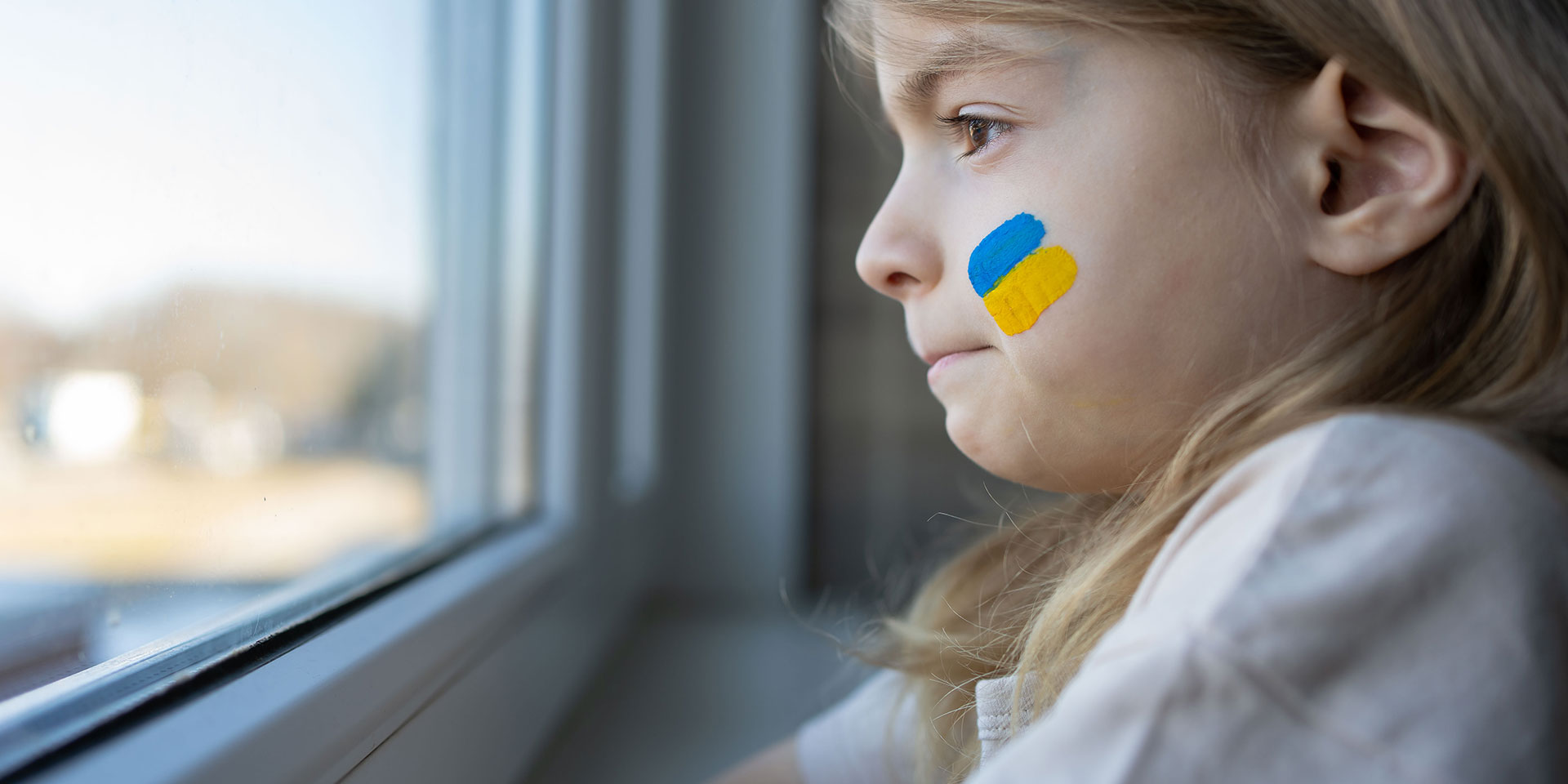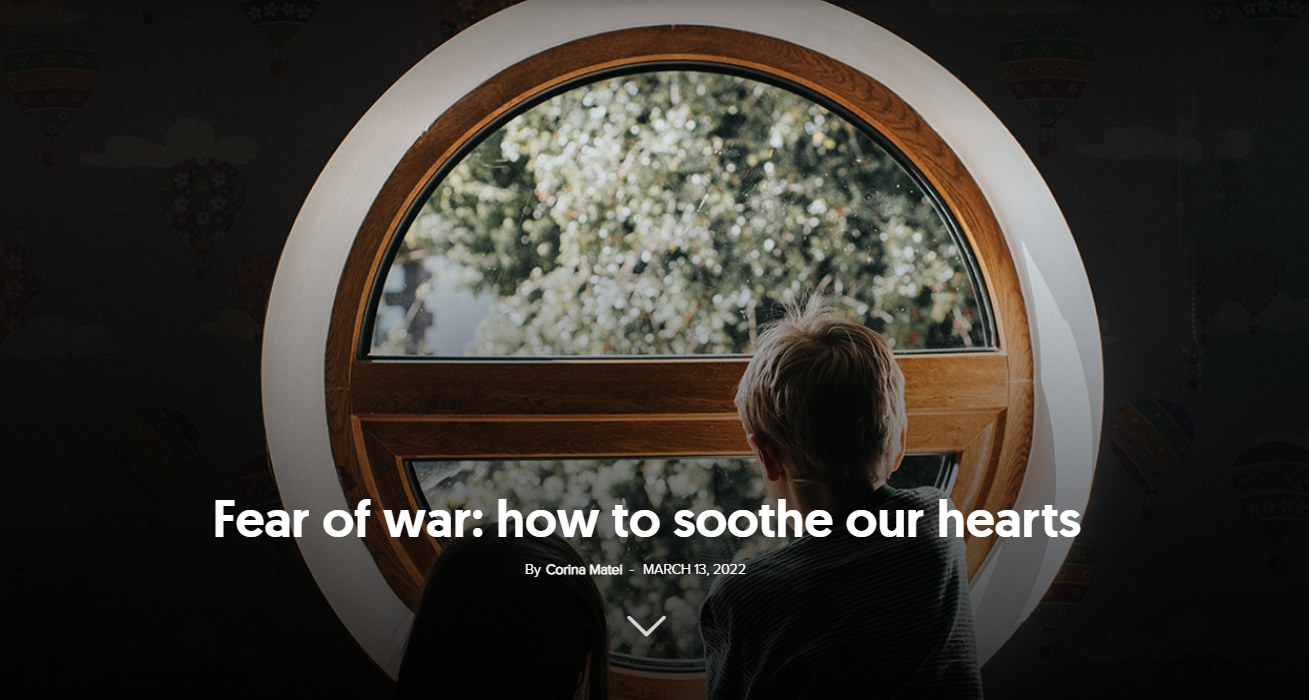We know how to do normal things in peacetime, but how do we keep our life going and maintain our hope in times of war?
“If we are all going to be destroyed by an atomic bomb, let that bomb when it comes find us doing sensible and human things—praying, working, teaching, reading, listening to music, bathing the children, playing tennis, chatting to our friends,” wrote C.S. Lewis.
It is the twenty-third day of war in Ukraine and a rollercoaster of emotions that keeps messing with us, as the news from Ukraine rapidly unfolds, changing the barely outlined scenarios of the analysts.
The bombings continue and intensify in several Ukrainian cities, increasing the number of casualties among civilians. There have been unprecedented sanctions on the Russian economy, but also on the billionaires in the Russian president’s inner circle, and rising inflation and prices across Europe, fueled by the war.
Russia has made accusations about the development of chemical weapons in Ukraine and Western officials are concerned about the possibility of Russia using chemical weapons in Kyiv. Four rounds of Russian-Ukrainian negotiations concluded without concrete results.
An overwhelming stream of information, which brings the war closer to our homes and minds, causes us to reconsider our level of security and ask ourselves: “What if the war reaches us?”
A different war, with a different stake
Even though there have been dozens of wars since the end of World War II, an invasion of Ukraine would different from almost all these conflicts, wrote journalist David Leonhardt on February 21, 2022 (just mere days before an actual invasion), in an article published by The New York Times.
The first reason he gives is that the invasion of Ukraine would involve the use of force by one of the world’s great powers, in order to expand regional domination. A voluntary war of aggression to expand borders or influence in the region is the exception in the eight decades since the end of World War II.
An attack on Ukraine would signal the beginning of a new era in which countries make decisions based on the size of their military strength, Leonhardt said.
Secondly, the invasion of Ukraine would be an unprecedented brutal step in an already ongoing crisis of global democracy, in which an autocracy would take over a democracy by force of arms—a sad scenario, as most Ukrainians have chosen democratic values, and all the more worrying, as democracy erodes from year to year, according to Freedom House reports from 2006 onwards.
The world watches the conflict in Ukraine with growing tension, mainly because this is not just a local war, but one with significant potential for escalation. What is at stake at the moment is “the stability in Europe and the whole international order,” EU Foreign Minister Josep Borrell said in recent days.
There are not many optimistic scenarios about how this conflict will evolve, according to an analysis that lists the opinions of several military experts and analysts. The analysis concludes that Vladimir Putin does not have much to gain from the immediate cessation of the conflict, but has much to lose: the talks about the need to remove the Russian president from office or the possibility of prosecuting him for genocide, war crimes and crimes against humanity could convince the Kremlin leader, if need be, that defeat is not an option.
We are not as close to World War III as we were during the Cold War, and a nuclear response by Russia as a reaction to the economic sanctions imposed on it is unlikely, says William Wohlforth, a professor of international politics at Dartmouth, stressing at the same time that it is difficult to predict the turn this crisis will take.
This war is significantly different from those we are used to, and its consequences could be major for Europe, including at the economic and security level. But a solution will be identified to defuse the conflict. What is missing right now is the “golden bridge” you give the enemy to retreat across, William Wohlforth believes, noting that stopping the crisis before it degenerates into “a truly hopeless situation” depends on finding the right combination of sanctions and potential rewards.
In times of war, spectators pay a hefty cost in terms of anxiety
The avalanche of news and images we follow daily, in real-time—of destroyed homes, desolate cities and civilians shot on the street—can cause vicarious trauma, explains Professor Bryan Robinson. This form of trauma, transmitted through observation rather than direct personal contact, is very real, and people who suffer from it often have the same symptoms as people who are the direct targets of terror.
The war in Ukraine “comes with a cost in terms of anxiety,” says Paul Salkovskis, a professor of clinical psychology at Oxford University, who worked on measures to help people deal with pandemic-related anxiety. War-induced anxiety is on the rise, says Salkovskis, explaining that fear is a response to a threat, a response that may be perfectly rational, but which requires specialised help when it becomes disabling.
At the heart of the anxiety is uncertainty, which generates behaviours such as increased news consumption in an attempt to better understand the nature of the threat, its seriousness or how it can be responded to, explains the professor.
Even if the war has more clarity than the pandemic (when the enemy was an unknown pathogen), apprehension is just as strong, and it is difficult to disengage because of the way our world works, explains neurologist Dean Burnett.
After two years of uncertainty and loss, the feelings many are experiencing with the start of the war in Ukraine are “anger, hopelessness, helplessness and numbness,” notes mental health expert Erin Jones, who claims that protecting mental health begins with how we relate to the flow of information.
Why it is necessary to limit the consumption of news
After the chronic stress caused by the pandemic, the threat of war makes some feel “there is never any good news anymore,” writes Barbara Sahakian, a professor in the Department of Psychiatry at Cambridge University, insisting on the need to resist the compulsive consumption of news.
Exposing ourselves to the high flow of information is overwhelming, which is why we should honestly determine the volume of news that exceeds the limits within which we can maintain our mental health.
We need to realise that it is essential to stay away from news bulletins and social networks, and allocate a fixed time interval, preferably reduced in size, points out Erin Jones. It is also necessary to inform ourselves using credible, objective sources that do not amplify fear by the way they present the information.
Two days after the 9/11 terrorist attacks, Steven Berkowitz, professor of psychiatry, gave a press conference at Yale University, and one of the first recommendations he made—when social networks did not exist—was to turn off the television. People shouldn’t check on war news more than twice a day, says Berkowitz, explaining that despite our perceptions, things don’t change that dramatically in 24 hours, at least if we’re not in a conflict zone.
The need to check our phone at short intervals, absorbing the latest news like a sponge, comes from the need for control and generates a false sense of control. In reality, we cannot control anything that happens in the war zone, and the advice of the experts is to focus on the things over which we have power.
How do we keep our balance in times of war?
Consuming healthy food, recreation, ensuring the necessary hours of sleep, hydration, spending time outdoors, and physical exercise are all part of a routine of care that we must not abandon in times of uncertainty.
A healthy diet, for example, can reduce the negative impact of stress on the body, says researcher Matthew Kuchan, explaining the “cascading effect” of food on brain health.
When we go through difficult times, we may experience sleep disturbances but this should not lead us to treat sleep as a peripheral problem because sleep and mental health influence each other, points out neurologist Jeffrey Wertheimer. Sleep deprivation can lead to higher levels of stress, frustration, depression and anxiety, and at the same time diminish the ability to solve problems, concentration, memory, the ability to connect with family and friends, and ultimately, it interferes with physical health, Wertheimer remarks.
Neglecting basic needs will intensify the way we react to the context of uncertainty in which we find ourselves.
The signals that our body sends us during periods of high anxiety become confusing and difficult to discern, so what we need to do is maintain our usual bedtime, hydrate, and eat at regular intervals, even if our body does not seem to feel the need for sleep, water, or food, writes psychotherapist Noel McDermott, explaining that neglecting basic needs will exacerbate the way we react to uncertainty.
In fact, when we focus on things over which we have some control, the fact that we remain effective in managing some parts of our lives reduces the feeling of overwhelm, explains Steven Berkowitz.
While devouring every news item about the war only gives us the illusion that we are involved in this crisis, there are healthier (and more useful) ways to help alleviate the suffering created by the conflict. The number of Ukrainians fleeing the horrors of war is growing every day, and the organisations that help refugees are increasingly in need of human and material resources.
Generosity is one of the best anti-anxiety medications we have today.
Studies show that the acts of kindness we make towards acquaintances or strangers are an effective strategy to erase the effects of daily stress on our emotional health. And while generosity is one of the best anti-anxiety drugs we have today, as psychologist Adam Grant argues, we have a strong reason (although it shouldn’t predominate) to provide relief for the many needs caused by the tragedy of war.
Faith in the face of crises that do not resolve
In May 1985, David Jacobsen, director of a hospital in Beirut, was abducted by Muslim extremists and held captive for 17 months. He spent the first part of his captivity tied up, was moved several times, forced to send messages dictated to him by his captors, and only was allowed outdoors twice in those 17 months. After his release, Jacobsen recounted how he had filled his time in those long days and how he had managed to keep his hope of release until the end.
In his book, Sometimes I Don’t Feel Like Praying, writer Mike Jones takes on and develops the techniques Jacobsen used to withstand the uncertainty and hardships of his detention, applying them to any major crisis a Christian may face and which doesn’t seem to resolve.
Believing that God is in charge of our lives is essential, Jones writes. God is not the author of the suffering that afflicts this planet, and He will not abandon us in any of our crises. If God is in charge, you will be free from pressure when crises arise. It is not just an extraordinary way of living, it is the only way that makes sense, concludes the author.
Looking at God more than at the crisis is another strategy we find used by many of the biblical characters. Although Goliath’s unusual stature intimidated an entire army, David managed to defeat him by relying on another reality, to which he had access only by faith. Peter discovered that he could walk on water—at least as long as his eyes were on Jesus and not on the size of the waves.
Our battles throughout our lives always have a spiritual stake, so the weapons we need must be supernatural—a truth that the psalmist emphasises when he recalls the history of his people, to conclude that: “I put no trust in my bow, my sword does not bring me victory; but you give us victory over our enemies, you put our adversaries to shame”(Psalm 44:6-7).
Trust in God’s promises remains the Christian’s lifeline in times of crisis. The Bible is full of promises that God makes to each of His children: He will take care of our needs (Philippians 4:19), He will fight for us (Exodus 14:14), He will advise us on the right path we need to follow (Psalm 32:8), He will be with us in times of trouble (Psalm 91:15), and He will give us “perfect peace,” if we trust in Him (Isaiah 26:3).
And, at the end of the history of sin, He will wipe away our tears, welcoming us to the joy of an everlasting Home, from which mourning, weeping, and sorrow will be eradicated forever (Revelation 21:4).
The more we internalise the Word, the deeper we get into its study, the more clearly God will be able to speak to us through it when we are away from Scripture.
If we want to be people who depend on God’s guidance at all times, we need to become people of the written Word, writes Professor Ron Clouzet, emphasising that the more we manage to internalise this Word, the more we delve into its study, the more clearly God will speak to us through it, in the times when we are far from the Scriptures.
Prayer is the place where we can bring all our fears and anxieties, 24 hours a day, making sure that there is Someone who hears us, understands our concerns and is willing to take on all this burden of worries, giving us His peace in return, “which transcends all understanding” (Philippians 4:7).
Hope in times of war
Wondering what is worth doing and what is not worth doing during a time of war, Christian writer C.S. Lewis observed that war is only the accentuated form of the familiar reality that we will die one day.
This is why the writer confessed that he was tempted to answer simply the question of how we should live in an atomic age: just as we would have lived in the 16th century, when the people of London faced the threat of the plague almost every year, and just as we already live in a world of incurable diseases and car accidents.
The atomic bomb is nothing more than a new possibility of dying prematurely, in a world with multiple such possibilities, where death is more than a simple probability, C.S.Lewis concluded.
I don’t think C.S. Lewis was trying to downplay the hideous face of war by comparing it to the innumerable sufferings that earthlings face. After all, the conclusion with which those who lived through wartime ended their stories (“Anything but war, no matter how hard it may be”), shows how deeply scarred human beings remain after an experience whose tragedy cannot accurately be described in words.
At the same time, in times of prosperity, we forget too easily the reality of the world in which we live and illude ourselves that we can control our lives—an illusion not shared by those living in the most disadvantaged and insecure regions of the world. Perhaps to a greater extent than other crises, war opens our eyes, showing us that we do not live in a pocket edition of paradise, but in a world deformed by sin, in which death, injustice, pain, and separation are the background over which life unfolds.
“The night is dark, and I am far from home; lead thou me on…” These are the lyrics of the anthem that resounded in the night while the Dutch prisoners—transported in animal trains by the Nazis towards the Ravensbruck camps—were preparing to sleep in the open air with only a thin blanket separating them from the damp earth.
They were the voices of the Ten Boom sisters, who took on the mission to spread hope in the hell of the Nazi camps, as they had done in freedom, when they sheltered any frightened Jew who had knocked on their door.
The night is still dark and we are still far from home, even though we have often let our roots go deeper into the earth than into the sky. But hope springs from where it has always sprung: from the One who left the Kingdom of Peace to suffer with us, but more intensely than all our experiences together, the pain of the war caused by sin.
Even if we do not understand everything, even if we are fearful, the God who has carried us through all the crises of the past can do that just as well in the future. In fact, He can do more than that: to light us up like a torch that will brighten up the ephemeral night.
Carmen Lăiu is editor at ST Network.




















